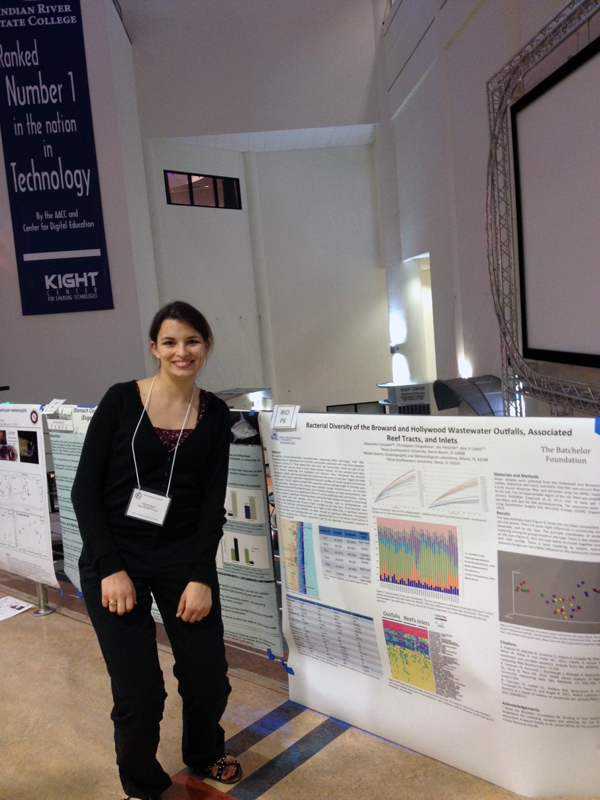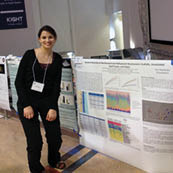
A number of undergraduate and graduate students from NSU’s Farquhar College of Arts and Sciences and the Oceanographic Center spent their Spring Break presenting research posters at the 78th Annual Meeting of the Florida Academy of Sciences, held at Indian River State College in Fort Pierce, Mar. 7–8. The following research was presented by NSU.
“Connectivity of Reef Fishes between Mangroves and Coral Reefs in Broward County, Florida”
Presenter: Jennifer Savaro, graduate student at the Oceanographic Center*
Advisers: Amy Hirons, Ph.D., assistant professor at the Farquhar College of Arts and Sciences; David Kerstetter, Ph.D., assistant professor, and Tracy Sutton, Ph.D., associate professor, at the Oceanographic Center
From the Abstract: “Many ecological and recreationally important species of marine fishes use the mangrove ecosystem for foraging, protection, spawning, and as a nursery habitat. This study examined the ontogenetic migration and trophic connectivity of reef fishes in Broward County, Florida to develop a better understanding of energy flow between the local mangrove and coral reef ecosystems. … The research [helps] clarify the relative importance of the various habitats essential for early life-history stages of reef fishes.”
*Savaro earned an Outstanding Graduate Student Poster Presentation award from the academy.
“Using an Engineered Trojan Horse to Kill Nematodes”
Presenters: Olena Bracho and Cyril Manchery, biology majors*
Advisers: Christopher Blanar, Ph.D., and Robert Smith, Ph.D., assistant professors at the Farquhar College of Arts and Sciences
From the Abstract: “Infections due to parasitic nematodes result in nearly 125,000 deaths annually. … In this study, we aim to develop gene circuit components that may be used to engineer Escherichia coli to act as a biological control agent of the model nematode Caenorhabditis elegans. We independently characterize two genetic modules: an attraction module and a killing module. … As such, our study establishes a quantitative framework for using these modules—and ultimately engineered bacteria—as a robust biocontrol agent for nematodes.
*Bracho and Manchery earned an Outstanding Undergraduate Student Poster Presentation award from the academy.
“Bacterial Diversity of the Wastewater Outfalls, Reefs, and Inlets of Broward County”
Presenters: Alexandra Campbell, graduate student at the Oceanographic Center; Jay Fleisher, Ph.D., from the College of Osteopathic Medicine; and Christopher Sinigalliano, Ph.D., from the National Oceanic and Atmospheric Administration’s Atlantic Oceanographic and Meteorological Laboratory
Adviser: Jose Lopez, Ph.D., professor at the Oceanographic Center
From the Abstract: “We applied culture-independent, next-generation sequencing technology— “454” DNA pyrosequencing—to characterize the microbial communities associated with near shore seawater in Broward County. These waters flow over coral reef communities, which are part of the Florida reef tract, and are close to shore where bathers frequent.” This project was supported in part by The Batchelor Foundation, Inc. in Miami, via aid awarded to Campbell.
“Garden-Based Learning Project with Elementary School Students”
Presenter: Tamara Gali, biology major
Adviser: Aarti Raja, Ph.D., assistant professor at the Farquhar College of Arts and Sciences
From the Abstract: “NSU students will be working in collaboration with local elementary school students to provide an environment for integrated learning. We are working with Manatee Bay Elementary School in Weston to build a Florida native garden on the school site, wherein a Florida heritage museum will be located. … This project will focus on creating a program that will help better integrate scientific education through a collaborative, hands-on learning program.”
“Histological Analysis Investigating the Macondo Oil Spill’s Impact on Crassostrea virginica”
Presenters: Timothy Chung and Ji Hae Hwang, biology majors
Adviser: Deanne Roopnarine, D.P.M., assistant professor and coordinator of biological sciences at the Farquhar College of Arts and Sciences
From the Abstract: “The Macondo Oil spill occurred in 2010, due to the explosion of the Deepwater Horizon oil rig. Its discharge covered a vast area of the northern Gulf of Mexico. This study examined the toxic effects of this event on the gill epithelia of the eastern oyster, Crassostrea virginica. The hypothesis was that the toxic chemicals found in the petroleum caused metaplasia in the oysters’ gill epithelia. … The results have shown that metaplasia has occurred. Metaplasia is a temporary alteration in the tissue and studies have shown that such an alteration can occur due to environmental stresses.”
“Particulate Matter as a Driver of Antibiotic Resistance”
Presenters: Patrick Doty, Divya Pandya, and Arti Patel, biology majors
Advisers: Song Gao, Ph.D., associate professor, and Robert Smith, Ph.D., assistant professor, at the Farquhar College of Arts and Sciences
From the Abstract: “It is becoming increasingly recognized that particulate matter in the atmosphere is a significant global health threat and environmental concern. … In this study, we examine the ability of selected organic compounds commonly found in particulate matter to generate antibiotic resistant bacteria. … Overall, our study presents evidence that ubiquitous organic compounds may serve to increase the rate at which antibiotic resistance evolves in the environment.”

